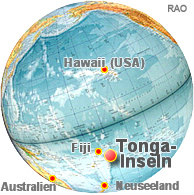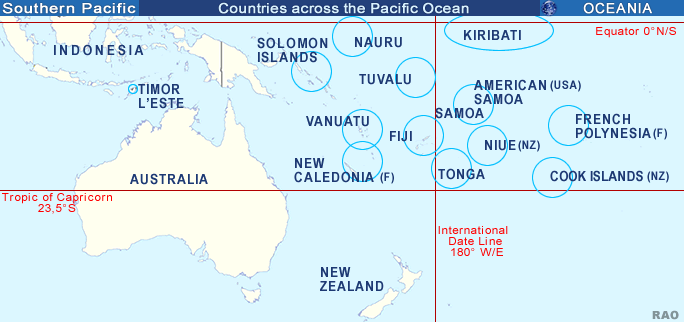| Staaten im Pazifischen Ozean |
 |
Ozeanien Pazifische Inseln - Tonga |
|
 |
Ozeanien Pazifische Inseln |
|
 |
|
Former King
Siaosi Tupou V: Traditional Ruler - Agent of Change
|
 |
 |
| His
Majesty King Siaosi Tupou V was born on May the 4th, 1948, in Nuku'alofa,
Tonga. He is the son of the late Monarch of Tonga, HM King Taufa'ahau Tupou
IV and HM Queen Halaevalu Mata'aho.
His
Majesty King Siaosi Tupou V holds all three ancient Kingly lines of Tonga;
the oldest and most sacred of these being the Tu'i Tonga title. The
last formal holder of this title was Laufilitonga who was defeated by Tupou
I, holder of the Tu'i Kanokupolu title, at the battle of Velata in Ha'apai.
The Tu'i Tonga title effectively became amalgamated into what is now the
Hau or ruling House of Tupou (1). |
|
The
King's grandmother Queen Salote's marriage to Tungi Mailefihi, a Tu'i Ha'atakalaua
Chief from Mu'a, completed the union of the three kingly lines of Tonga.
His Majesty King Siaosi Tupou V is the undisputed Hau of Tonga in every
sense of the word.
As
the eldest of the late King's four children, He was conferred with the
heir apparent title of Tupouto'a. Tupouto'a is now the Heir apparent
title but has its origins in the progenitor of the current line of the
Hau of Tonga (2). His Majesty has only one
sister, HRH Princess Salote Mafile'o Pilolevu Tuita, and two brothers,
the Hon Ma'atu formerly known as HRH Prince Fatafehi Alaivahamama'o Tuku'aho
(3) who passed away in 2004. His youngest brother
is HRH Prince Tupouto'a Lavaka, who is the new Heir to the Tongan throne.
His
Majesty King Siaosi Tupou V went to Primary School in Tonga and received
further education in Switzerland and at Kings College in New Zealand.
The new King has been criticised by some because of his overseas schooling
and exposure to Europe. A former Kings College Master was quoted
in a newspaper recently as criticising the late King's choice of schools
for his heir apparent son, stating that He had "grandiose ideas" for aiming
'higher' than Kings College, a private school in South Auckland.
This
begs the rhetorical question, as to how one would prepare and educate a
King for leadership in the 21st century? It is certainly not a decision
lightly made, when one has the best interests of the people at heart -
even when a country is as small as Tonga. The late King was the first
Tongan ever to receive a university degree, he in fact gained two i.e.
BA/LLB. The late Monarch watched the world change considerably within
his lifetime. In many respects, with increasing technology and improved
transport, the world became smaller and the idea of a global village was
realised.
Schooled
by Missionaries in Tonga initially, the late King chose to send his son
much farther abroad than Australia, where He was sent towards the end of
his secondary schooling. After studying in Switzerland and New Zealand,
the Crown Prince was sent by his father to the prestigious Royal Military
Academy Sandhurst (RMAS) spending three years there. Prince William
of Wales is currently in his third term at RMAS. Sandhurst has a
distinguished alumni including Sir Winston Churchill. It was this
training that consolidated a keen interest in military strategy, tactics
and modern armaments. The new King is currently Colonel-in-Chief
of the Kingdom's battalion-sized military, the Tonga Defence Services.
The Tonga Defence Services has served in Iraq, and deployed peace-keeping
missions in the Solomon Islands and Bougainville, making an active contribution
to the region.
HM
King Siaosi Tupou V has served as a Minister in Tongan Government for over
twenty years, gaining considerable insight into the affairs of state.
It was well known that He was the only member of the Royal Family to publicly
express disapproval of less progressive measures taken by the Government,
until His cousin HRH Prince Tu'ipelehake took on the mantle of seriously
campaigning for political reform. When moves were made to curb media
freedoms in Tonga, as Crown Prince, the current King publicly stated in
a television interview that he was against the amendment to the constitution.
He went as far as to say that this was a mistake by government.
The
new King was an advocate of the National Committee for Political Reform
(NCPR), informally known as the Tu'ipelehake Committee. He has also
been credited with strongly influencing the appointment of successful businessman
and pro-democracy supporter Dr Feleti Sevele as Prime Minister. As
Crown Prince, He made recommendations for a more democratic approach by
the late Monarch over appointments to Cabinet. These were accepted,
marking an important shift in power.
Being
the first among the Royal Family to acknowledge the need for reforms, it
should not be surprising that in His first detailed proclamation, HM King
Siaosi Tupou V has promised to hasten appropriate changes to the system
of government in response to the democratic wishes of the people.
The
Report of the National Committee for Political Reform was presented to
the late Monarch weeks before His passing. In many ways, it was part
of the inheritance of the new King, who has pledged commitment to the reform
process. He has supported a process whereby extensive public consultation
will inform the basis for change.
The
NCPR report revealed that a majority of Tongans wanted the traditional
social structure of the king, nobles and the people to remain untouched,
"but there must be changes to the structure of government and how government
is administered." In His first public address to the people of Ha'apai,
HM King Siaosi Tupou has signalled considerable changes will be made to
Government in Tonga. He also restated his commitment to democratic
reform.
Being
a keen businessman and displaying considerable acumen in the area of business,
it is also not surprising that His Majesty the King views strengthening
private enterprise as critical to lifting Tonga's standards of living.
It is fair to say that the new King's personal business interests have
been an issue of concern for some. His first proclamation on the
death of His father was to renounce all personal business interests and
focus instead on the leadership, duties and responsibilities of Kingship.
His business acumen and experience of running successful and profitable
businesses may indeed be a considerable asset for the Kingdom as it moves
into a new era. All countries are looking to increase exports, discover
new markets and improve gross domestic product. HM King Siaosi V
has identified that reform of the civil service, improvements to infrastructure,
and making the most of information technology opportunities will be key
drivers.
Fluent
in several languages, a former Minister of Foreign Affairs and a graduate
of the Oxford University Foreign Service Programme, the King will be an
advocate for Tonga in the new global village era. His many connections
and friendships with world leaders and royalty abroad can only have positive
spin-offs for the small Kingdom.
Thanks
to growing information technology, ironically, it seems the world is even
smaller, yet Tonga - with its diaspora spread throughout the world - has
somehow got larger. Certainly, the expectations of Tongans have grown
considerably and the desire and calls for democratic change have become
demonstrably stronger and louder. This is something that the new
King has been acutely aware of - for a long period of time. He believes
strongly that Tonga's political system has not evolved commensurate with
economic development.
After
all, as noted by HM King Siaosi Tupou V Himself, all the great Kings of
Tonga were agents of change. The Kingdom and people of Tonga look
forward to Him realising that legacy.
[1]
The former holders of the Tu'i Tonga title now hold the noble title and
estates of Kalaniuvalu.
[2]
Tupouto'a married Taufa Hoamofaleono, a daughter of Ma'afu and their son
was King Siaosi Tupou I, known as the founder of modern Tonga.
[3]
Tuku'aho is also a title connected to the ascension of the ruling House
of Tupou. Finau Tuku'aho was a Tu'i Kanokupolu and the father of
Tupouto'a. His assassination in 1799 sparked the long and bloody
civil war that followed.
| Source:
Palace Office, the Kingdom of Tonga, 2007 |
 |
| Death of King George Tupou V |
|
| Former King George Tupou V passed away on 18 March 2012. |
|
| Coronotation König Tupou VI |
|
| The king of the Pacific island nation of Tonga, Tupou VI, has been formally crowned on 3rd of July 2015. |
|
nach
oben
| Weitere Informationen |
 |
| Links |
 |
 |
 |
Externe
Links |
|




